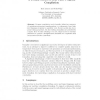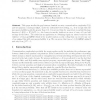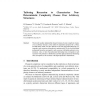1686 search results - page 43 / 338 » Programs as polygraphs: computability and complexity |
ICLP
2003
Springer
15 years 5 months ago
2003
Springer
Logic programming is based on the idea that computation is controlled inference. The Extended Andorra Model provides a very powerful framework that supports both co-routining and p...
ARTS
1999
Springer
15 years 4 months ago
1999
Springer
Program compilation can be formally defined as a sequence of equivalence-preserving transformations, or refinements, from highlevel language programs to assembler code. Recent mo...
SIGCSE
2008
ACM
14 years 11 months ago
2008
ACM
Providing consistent, instant, and detailed feedback to students has been a big challenge in teaching Web based computing, given the complexity of project assignments and the comp...
ICALP
2007
Springer
15 years 6 months ago
2007
Springer
This paper studies the gap between classical one-way communication complexity C(f) and its quantum counterpart Q(f), under the unbounded-error setting, i.e., it is enough that the ...
IFIP
2004
Springer
15 years 5 months ago
2004
Springer
We provide machine-independent characterizations of some complexity classes, over an arbitrary structure, in the model of computation proposed by L. Blum, M. Shub and S. Smale. We ...



